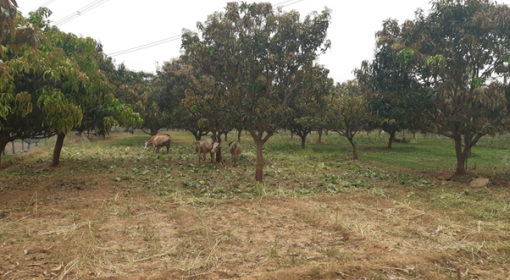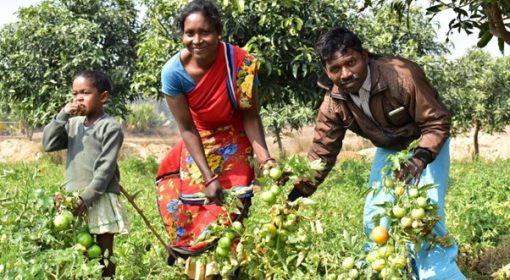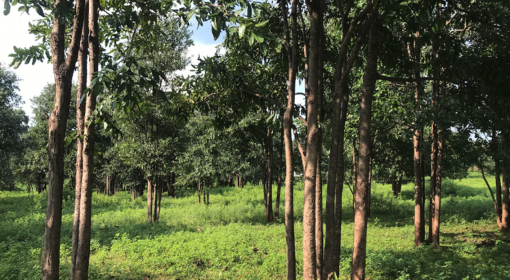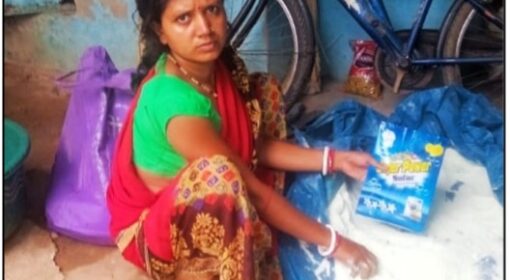Foundation for Ecological Security (FES) team
The Gond and other Indian tribes residing in villages initially followed traditional farming practices. However, they eventually transitioned to using chemical fertilizers and pesticides, which had detrimental effects on their soil quality. This shift prompted concerns about the sustainability of their farming methods. Enter natural farming—a philosophy aimed at embracing environmentally-friendly practices, minimizing and mostly zero chemical fertilizer use, employing locally-sourced seeds, mostly native seeds, safeguarding crops, and ensuring consistent production for food security.
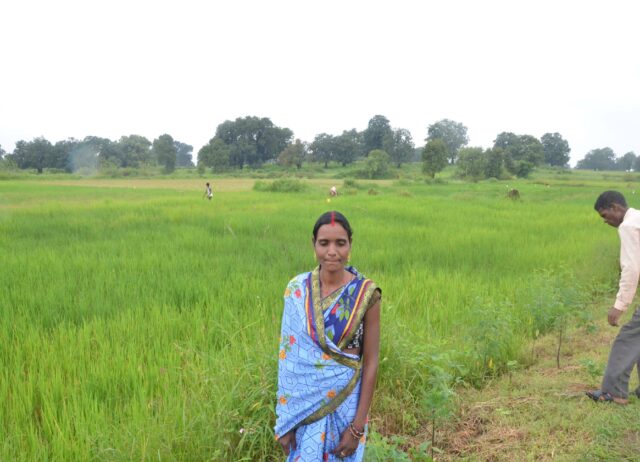
While interacting with the farmers, they said that this soil became a little harder due to the use of chemical fertilizers and pesticides, and the land quality started deteriorating. They foresaw a future in which their yields would dwindle if reliance on such chemicals persisted. This dependence on external solutions would ultimately erode their profits as the market claimed a larger share. Amidst these challenges, the concept of natural farming, elucidated by the FES team, emerged as a beacon of hope. The team outlined the six core principles of natural farming and elucidated how these principles could safeguard crop production. This revelation sparked a realization within the farming community: the path to sustainable crop yields lay in embracing natural farming practices. Gradually more farmers started attending the regular village meeting. The FES team organized village-level training on natural farming, its core principles, and how it can reduce their expenses by doing physical work in preparing all their solutions by collecting leaves, soil, and other ingredients from their farmlands or the commons near their villages. It was a new thing for them, but they decided to adopt natural farming, and this way, the journey of natural farming started in this village.

Let’s delve into a real-life case study that offers insights into the practical transformation at the grassroots level. Meet Lakshmi Devi Bairagi from the village Singpur, India, a motivated and enthusiastic woman farmer who convinced herself while working in the village development as Gram Mitra on natural farming. She thinks it will give sustainable farm production and bring positive changes to her village where she was born and raised and married a youth from the same village. She thinks it requires a little harder work than chemical farming, but it gives the security of wealth, good food, and a better future.

She said self-conviction is very important to adopt any new concept and convince others. She also convinced her mother to adopt the principle of natural farming as her brother works in another place, and her mother can’t take care of their farmland alone and needs Lakshmi’s help.
With limited land upon marriage, Lakshmi Devi Bairagi pursued natural farming on her mother’s 30-decimal plot, convinced others of its merit. Simultaneously, she formed a women’s group to promote the practice in her village. Her unwavering conviction and energy propelled her to share natural farming’s essence in every village interaction.

On her mother’s land, Lakshmi Devi innovated: crafting 10 raised beds for maize and vegetables via line sowing, while embracing green leaf mulching—a new technique. Recognizing its potential to boost fertility in 3-4 years, she collected leaves from the village, considering it a healthier alternative to labor-intensive chemical fertilizers. She said if she did 10 days of labor and bought chemical fertilizer, it would harm their farmland and her health. But if she spends one-day collecting leaves and mulching, it will save their crops and improve the fertility of her farmland and good health.
In her paddy field, she embraced line sowing and natural farming principles. Transforming barren upland, unused for decades, she cultivated crops yielding fodder. On her Bharra land, Lakshmi Devi’s multi-cropping strategy—incorporating 8-10 crops—ensured fodder, grains, oilseeds, and 6-8 months of land cover.
She was very much convinced while sharing her experience about her natural farming practices that my natural farming is very much dependent on my commons and that without commons, I cannot do natural farming sustainably. Answering the question – why does she see a strong connection between commons and natural farming? She proudly replied that in natural farming, we need cow dung and cow urine to prepare manures, different types of insecticides, and pesticides. And my animals are primarily dependent on the commons for fodder. I do not have sufficient fodder to feed them. Every day they go to the village commons to graze. At my home, I can provide a maximum of 2 to 3 different types of fodder and little grains, but in the commons, they can graze different types of fodder, leaves, seeds, and fruits, enhancing the quality of their dung and urine. We never did tests anywhere, but we firmly believe that when they graze in the commons, their dung is richer than we get by stall feeding. She said that the whole day they graze in the commons and litter in the commons, and when they come back home, they give nutrient-rich dung.
That is why we need to protect our commons. She said we never realized earlier, but when making these different types of pesticides and insecticides that time, we had a casual discussion within our women’s group. Then someone in the village raised this point, and we all did the analysis and made a long list of different types of grasses, leaves, herbs, and seeds which they only get in the commons. Therefore, I see a very strong connection between natural farming and commons.
She is expecting good-quality production this year. She happily said that this year they received continuous rains and, in this condition, her maize, paddy, and mixed crops in bharra land (upland) are healthy and in good shape compared to neighboring farmers.
She also helped:
- 45 farmers in making ghan jivamrit
- Motivated 18 farmers to go for line sowing
- Also helped more than 50 other women in their group, along with other women of the village, start natural farming
